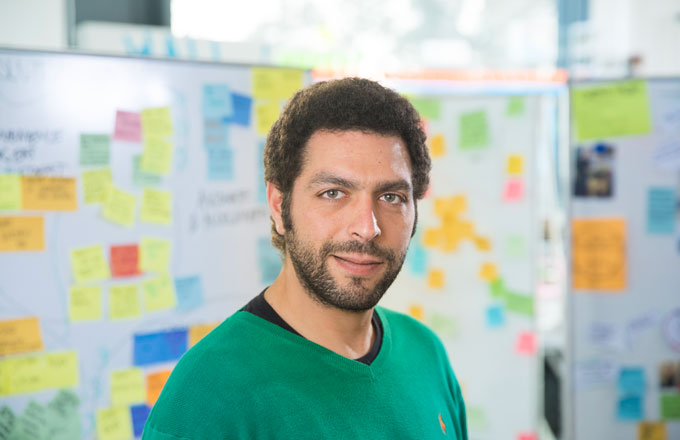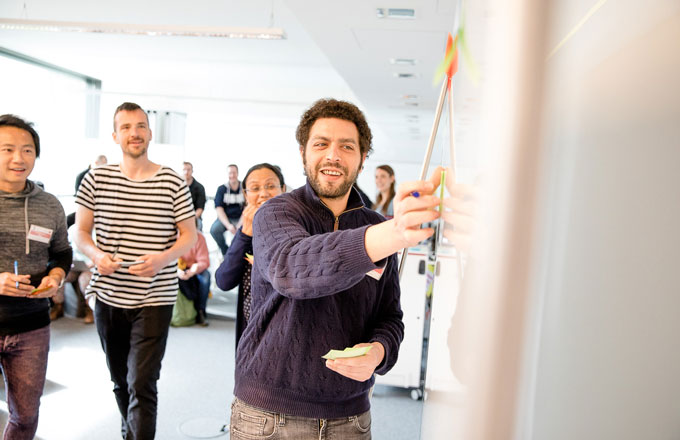Meet our new Knowledge Manager Sherif Osman
We are happy to welcome a new colleague to the HPI D-School team! A couple of months ago Sherif Osman moved to Potsdam from Cairo to become our new Knowledge Manager. Before joining the HPI D-School, he taught creative thinking, Design Thinking and game thinking at the American University in Cairo (AUC). To learn more about his background and experiences with Design Thinking, we asked Sherif a couple of questions.
Hi Sherif, welcome to the HPI D-School! You have worked as a secondary teacher and later as a consultant in many different areas and are an expert in educational design. Where do you see the most severe pitfalls in the education systems you have encountered? What is your approach to solving them?
I worked for a while in educational reform, as well as a teacher, faculty developer and learning designer. In all three roles I always identified two main pitfalls. The first, in my opinion, is the traditional mode of education that is still rife in many educational settings today and the resistance to change.
The second problem is a growing resistance from teachers to adopt new methodologies for learning, teaching and learning design. This resistance could be attributed to many different factors but is usually manifested because of the gap in perspectives that exists between teachers and administrators. The field of education exploded with new terminology, approaches and buzz words over the past two decades and teachers can be forgiven in losing trust when every semester there is a new “right way” to teach. It has become a challenge to convince some teachers that there are now more valid pedagogical frameworks, and not just the new fad of teaching this year. This problem is complex and multifaceted; one can presume it could be because of communication, policy setting or a lack of trust.
My approach is to try to promote the understanding that there is no one correct way to teach, or learn for that matter. Context and learner centricity are probably the most important factors to be considered here. I try to study varying pedagogical frameworks and relate them to learners’ needs to identify which teaching techniques would be more suitable for those learners. In what way should I design the learning experience to help overcome their challenges or barriers to engagement?
You are also a coach for Game Thinking and Creative Teaching. What is Game Thinking and how can Gamification support learning processes? Can you tell us about a project where you applied this approach?
I am a big fan of Game Thinking and Design Thinking and my knowledge in both disciplines stemmed out of pure curiosity. I wanted to know why and how to engage and motivate people and there was no other field that can compete with gaming in that regard. Game thinking to me is a spectrum, spanning from a full interactive game (as we know it) to game-like actions or abstractions in different contexts, playful design if you like.
In my experience, the main barrier to learning for most students is a lack of engagement, whether with content, with the instructor or with their peers and environment. Studying and understanding why and how people respond to certain game mechanics and dynamics can leverage your ability to create better drivers for engagement, better triggers for both intrinsic and extrinsic motivation. Game Thinking for me provides a nice framework to really be user-centered when identifying rewards and incentives for learners.
I used this approach to gamify a teacher development course in the Professional Educator’s Diploma in the American University in Cairo. I included several game mechanics and dynamics to allow the students to determine their own learning path, allowing them choices in their assignments, different assignment values (for difficulty cycles) and varied user centered rewards and motivators. The results were very encouraging and actually resulted in the students voluntarily doing twice as many assignments as any previous semester, with higher quality.
Which projects do you look forward to tackle in your role as Knowledge Manager at the HPI D-School?
I am very excited to try and review the process of documenting Design Thinking projects. It is such a dynamic process and capturing your key insights and processes is not always straight forward. I am looking forward to designing solutions for this process.
I am also keen in utilizing the Design Thinking process to create a more user centered approach to the knowledge handling, sharing and management at the HPI D-School. Finally, I am excited to learn about the findings from the research team at the HPI D-School and to conduct my own research. I think it is important to continuously strive for the integration of research findings into our programs and approaches.
Thank you and welcome again to our team. We look forward to working with you!
About Sherif Osman:
Sherif joined the HPI D-School in 2018 as a Knowledge Manager. Before that he taught creative thinking, design thinking and game thinking at the American University in Cairo (AUC). During his time at AUC, he also worked as a faculty developer at the university’s Center for Learning and Teaching, where he designed, consulted on and delivered several courses, workshops, online courses and MOOCs. He also designed and managed a professional development program for teaching assistants and graduate students. Prior to that he worked as a high school teacher and network support analyst. Over the past few years he co-founded a startup for educational and innovation design and another focused on educational technology.
Sherif graduated with a BSc in Computer Science from the University of Liverpool in 2007, he completed a Post Graduate Certificate of Education in 2010 from Liverpool Hope University and went on to complete his MA Education at the same institution by 2012. His research interest focus on Learning Experience Design, Game Thinking, Creative Pedagogies and Design Thinking.
Photos: Kay Herschelmann / Jana Legler / HPI School of Design Thinking


